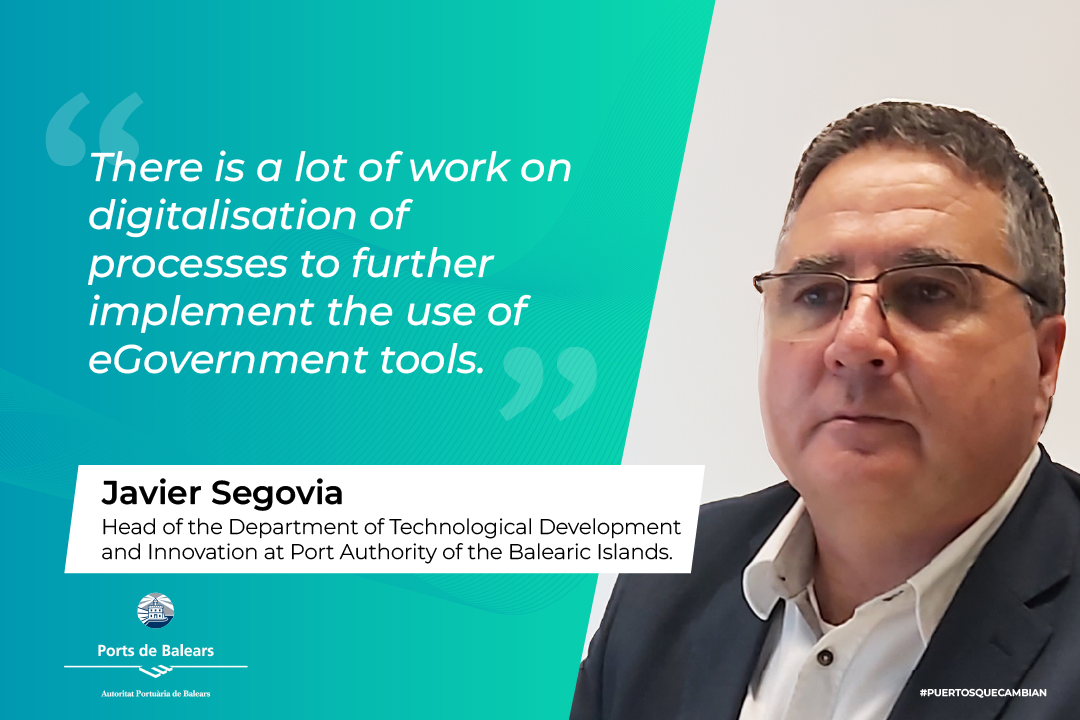The Balearic Islands Port Authority (APB) manages the 5 ports of general interest that exist in the Balearic Islands. It is the gateway for more than 95% of the goods arriving in the Balearic Islands, making it a key player in the local economy.
Thanks to its privileged location, the Port Authority of the Balearic Islands is the leader in Spain in terms of passenger transport, with more than 10 million passengers, and in the number of vessel calls, with almost 50,000 calls, according to figures from the 2023 report.
It is also recognised for being one of the most environmentally involved Public Administrations. It is also recognised for being one of the most environmentally involved Public Administrations, as demonstrated by its participation in a multitude of R+D+i projects focused on reducing carbon emissions, air care, etc.
Javier Segovia, Head of the Department of Technological Development and Innovation at APB.
A Computer Engineer from the University of the Balearic Islands and University Expert in Innovation and Digitalisation of the Logistics-Port Sector from the Universitat Politècnica de València, Javier Segovia, with 30 years of experience in the APB, is a standard bearer of digital transformation who has always advocated the use of new technologies and the advantages they bring.
- In a totally globalised economy, digital transformation is a must for any organisation, could you briefly describe how you see the current situation in the port sector?
I see that there is a lot of work to be done in the digitisation of processes in order to apply the use of e-government tools and, above all, there is a lack of data governance to eliminate information silos in the applications and to create single data entities for the organisation. On these two points, there is still a long way to go and this should be done in an aligned way within the port sector to be able to exchange information in a more natural and easy way.
- What are the main challenges facing European ports from your point of view?
If we managed to have a single port data model at European level, it would be much easier to carry out procedures between European ports, as well as for port users to interact with each of them. We need to talk about the same thing and with the same coding in the data masters. I know that work is being done on this, but instead of making an efficient model that we can all adapt to, I have the feeling that we are making a model that adapts to all ports. I hope I’m wrong, but that’s the feeling I get.
- The APB has always stood out for its firm commitment to sustainability. What are the most relevant projects or initiatives in which you have participated in recent years?
One of the main projects is the implementation of electronic administration throughout the APB. We have been working on this for 10 years, seeking to be more efficient, reducing the distance between our ports by eliminating the need to transport documentation by eliminating the use of paper. There is no need to file it, as it files itself from the classification made from the beginning of the creation of the document in the APB, and there is no need to store it, as everything is done electronically. It should be noted that the APB manages the 5 ports of general interest on the 4 main islands of the Balearic Islands.
Another important project is the Eiffel project, which aims to develop a series of climate change adaptation and mitigation applications using data sources, both from satellites and sensors. This project has been carried out jointly with Prodevelop and several universities
- The relationship between APB and Prodevelop has been going on for more than 10 years, what does it mean for APB to work with the Posidonia Suite? What advantages do you enjoy?
It is a fundamental part of APB’s day-to-day work as it manages all the services it provides to the Balearic community and the stakeholders who use the port. It is our main tool for managing the entire Port Authority and therefore our 5 ports. It is capable of resolving the problems of port operations as well as managing all the port public domain space under the responsibility of the APB.
It has provided us with several advantages: it has adapted perfectly to the volume of data handled by the APB and over the years it has adapted to all our needs, making it a system that is flexible enough to be implemented in any Port Authority.
- Where do you think the sector is heading and what are the main actions that you think the ports should adopt to adapt to the changes that are coming? How do you think a company like Prodevelop fits into this future?
As I said before, I believe that data governance is fundamental and will be the basis for interoperating between the different Port Authorities and between the other administrations. Having a single data model, with shared masters, will allow the information to be shared and reused by the whole of Spanish society, whether it is related to the ports or not.
I believe that Prodevelop is in a unique situation as it is one of the only companies capable of developing port software for all port authorities, making it possible to align the data so that if in the future we are asked to interoperate, share and collaborate on a data level, we can easily align all the organisations as we are present in most of them.




